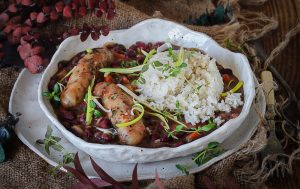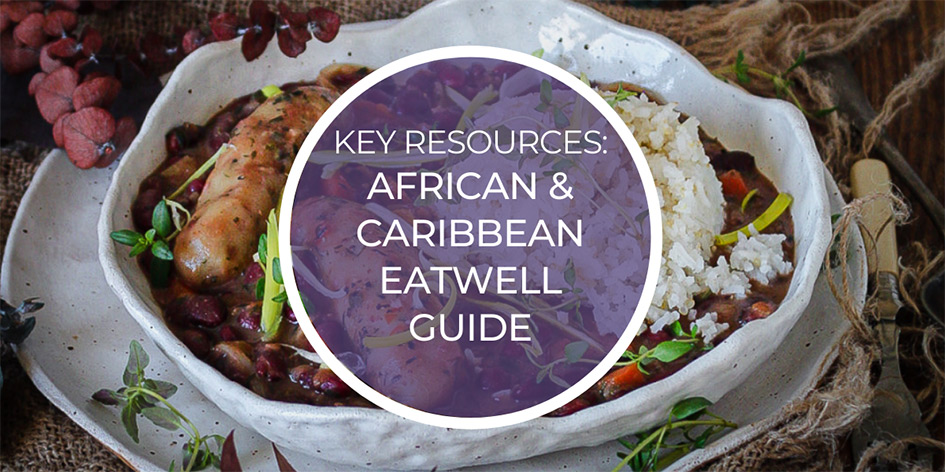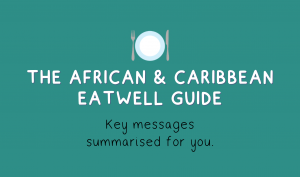Following on from our webinar ‘African and Caribbean Eatwell Guide’, we’ve pulled together some of the key resources and references discussed within the webinar, plus some additional ones on the topic. We have also included useful websites and social media accounts recommended to keep up to date on the subject. If you missed the live webinar, you can watch the recording.
Download a PDF visual summary of the main symposium messages.
REPORTS, GUIDELINES & RESEARCH
Patient experience in adult NHS services: Improving the experience of care for people using adult NHS services (2021). National Institute for Health and Care Excellence (NICE). Guidelines for the care of NHS patients, including tailoring healthcare services for each patient
Culturally appropriate care (2021). Care Quality Commission. Guidance for providers into culturally appropriate care
Population of England and Wales (2020). GOV UK. Main facts and figures for the total population of England and Wales
Healthy Eating Among Adults (2019). GOV UK. Facts and Figures around consumption of 5-a-day among different ethnicities, highlighting that Black adults in England had the lowest percentage of fruit and vegetable intake
2011 Census Analysis: Ethnicity and religion of the non-UK born population in England and Wales (2011). Office for National Statistics. Latest census showing population of England and Wales by ethnicity
RESEARCH PAPERS AND ARTICLES
Cultural Diets and the need for diversity in dietetics (2021). Anjanee Kohli for the British Dietetic Association . Article highlighting the the need for diversity and equality within dietetics
A Lesson in Diversity (2021). Caroline Frascina and Claire Gardiner for the British Dietetic Association. Article highlighting the need to improve ethnic diversity in allied health professions
Black Lives Matter in Dietetics (2021). Jasmine Carbon RD for the British Dietetic Association. Reflections from the BDA’s ‘Black Lives Matter in Dietetics’ event
Cultural Humility vs Cultural Competence – and why providers need both (2021). Shamaila Khan PhD. Article discussing the phrases cultural humility and cultural competence, highlighting the differences and need for both
Giving Culturally Relevant Advice in Healthcare (2020). Widlims Podcast. Podcast featuring Amaeze Madukah discussing health inequalities and why we must give culturally relevant advice and more
Black Skin, Sunscreen and Vitamin D (2019). Black Skin Directory. Article exploring the importance of Vitamin D and how to maintain adequate levels whilst also protecting skin from UV damage
Vitamin D: The “sunshine” vitamin (2012). Nair R and Maseeh A. Research paper into Vitamin D insufficiency and the differences observed for Black people
How Do I Become Culturally Competent? (2010). Rebecca A. Clay. Article highlighting the benefits of cultural competence
Hypertension and ethnic group (2006). British Medical Journal. Study finding high levels of salt within African and Caribbean foods
PRACTICAL RESOURCES
The African and Caribbean Eatwell Guide (2021). The Diverse Nutrition Association. Download the PDF guide from the Diverse Nutrition Association website
The Diverse Nutrition Association Factsheets. The Diverse Nutrition Association. A range of factsheets available to download including Sugar, Cholesterol and Salt
Healthy Eating for African and Caribbean Individuals (2021). Tai Ibitoye RD for the British Dietetic Association (BDA). Healthy eating advice for the African and Caribbean communities showing that favourite foods don’t need to be given up
Healthy Eating Tips for African and Caribbean Diets (2021). Tai Ibitoye RD. Healthy eating tips that are culturally appropriate
Heart Healthy African and Caribbean Diets. Tai Ibitoye RD for HEART UK. Practical advice, including food swaps for the African and Caribbean diets
Healthy Eating – The African Caribbean Way. Blood Pressure Association. 12 page leaflet with culturally appropriate advice
Salt and Ethnic Minorities. Action on Salt. Practical tips for ethnic minorities living in the UK, including people of Black African descent
Your Ethnic Background and Your Blood Pressure. Blood Pressure UK. Information about risk of high blood pressure for different ethnic backgrounds including African Caribbean. Includes practical advice.
How African Caribbean background can affect your heart health. British Heart Foundation. How ethnic origin can affect heart and circulatory health
World Foods .(2019). Salma Mehar, Dr Joan St John, Chris Cheyette and Yello Balolia. A visual guide to African, Arabic, Caribbean and South Asian foods for diabetes & weight management
African and Caribbean Diets. Tai Talks Nutrition. Information sheets for African and Caribbean Diets (password protected which needs to be requested)
SOCIAL MEDIA
@diversenutr (Twitter), @diversenutritionassociation (Instagram) and The Diverse Nutrition Association (Website) for the Diverse Nutrition Association
@Lifes_recipe (Twitter), lifes_recipe (Instagram) and Life’s Recipe (Website) for Amaeze Madukah MSc RNutr Co-Founder of the Diverse Nutrition Association
@barescientist (Twitter) and The Bare Scientist (Instagram) for Melissa Research Scientist & Registered Associate Nutritionist, Co-Founder of The Diverse Nutrition Association
ashleighsimpson (Instagram) for Ashleigh Simpson, Nutritionist and Co-Founder of The Diverse Nutrition Association
ourhealthnetwork (Instagram) for Our Health Network – A Network for Black AfN Reg Nutritionists and Dietitians
@TaiIbitoyeRD (Twitter) and taitalksnutrition (Instagram) for Tai Ibitoye UK RD with specialist advice on diversity
RELATED MYNUTRIWEB CONTENT
South Asian Eatwell guide (2021). 60 mins webinar with Fareeha Jay RD discussing the importance of culturally competent advice and the use of her new South Asian Eatwell Guide
South Asian Eatwell Guide (2021). Blog post by Fareeha Jay around the new Eatwell Guide where you can download the PDF of the South Asian Eatwell Guide
Sugar Awareness in the South Asian Diet (2021). Blog post by Fareeha Jay with practical advice for sugar within the South Asian diet
Ramadan: Top Tips for Eating Well (2021). Shehnaz Bashir RD. Blog post with practical tips for how to eat well during Ramadan
RECIPE
Here’s a recipe from The Diverse Nutrition Association for Stew Peas and Spinners, representative of the African and Caribbean cuisine:
There are several variations of this traditional dish, but certain base ingredients such as the coconut milk, kidney beans which Jamaicans call peas, and dumplings (spinners) are a staple! You’ll need (Serves 6):
Stew Peas:
350g kidney beans (dried, soaked & cooked or tinned)
1 tbsp olive oil
1 large yellow onion (chopped into chunks)
6 large cloves garlic (minced)
4-5 sprigs of fresh thyme
1 large stalk of celery (finely chopped)
1 large carrot (finely chopped)
1 large red bell pepper (finely chopped)
1 red scotch bonnet pepper (finely sliced or place the pepper in whole & remove at the end for less heat)
4-5 pimento berries or 2 tsp ground all spice
1 tbsp black pepper
1 tbsp dried mixed herbs
Pinch of salt
400ml of reserved kidney bean water
400ml reduced fat coconut milk
1 tbsp cornflour
2 – 3 stalks spring onions, (sliced for garnish)
Spinners:
180g plain flour
~100ml water
Salt to taste (original recipe is 2tsp but we recommend to use less)
1 tbsp dried mixed herbs
Method:
Soak kidney beans overnight. Once ready, discard the water & thoroughly wash before placing in a large deep saucepan of water to boil for approximately 40 mins until the beans are pierceable with a fork. Reserve the water that the beans are cooked in for the stew. If you prefer you can used tinned kidney beans to save time!
Heat a large, deep pot over a medium high heat & add olive oil. Once hot, add in onions & fry until slightly translucent. Add garlic and sauté for a further minute.
Add carrot, peppers, thyme, scotch bonnet & celery. Leave to cook for a further 3-4 mins & add a pinch of salt, pepper, herbs & pimento (allspice)
Add the kidney beans to the pot & mix, leaving to sauté for 1-2 mins
Reduce the heat to medium-low, gently mix in the coconut milk & 400ml of the reserved kidney bean water
Mix 1 tbsp cornflour with a few tbsps of water from the stew to form a thick paste & add back into the stew. Leave to gently simmer over a low heat.
To prepare the dumplings, add flour, salt & dried mixed herbs to a mixing bowl & add water. Mix to form a dough. Tip out onto a lightly floured surface & knead for a few mins until slightly firm. Shape into a log & tear off small pieces, initially rolling into a ball & then spinning back & forth to form little cylinders.
Add the dumplings to the stew & ensure they are covered with the liquid
Cover the pot & leave to simmer for a further 20- 25 mins, until the dumplings are firm.
Serve with a small-medium serving of rice &quinoa mixed, garnish with spring onions and fresh thyme.
Do you have any recommended resources for this topic? If so, please do comment below.








Our chief taste tester Rosie has just shared with me that this recipe is so delicious. I cant wait to try it this weekend. I am going to try with wholemeal flour in the spinners and see if it meets the taste test at home 🙂
Wow found the resource on the healthy eating for African and Caribbean individuals on BDA and Heart UK very helpful for my outpatient cardiology clinic. Thank you NutriWeb. Printed it out for clinic. Great webinar too.